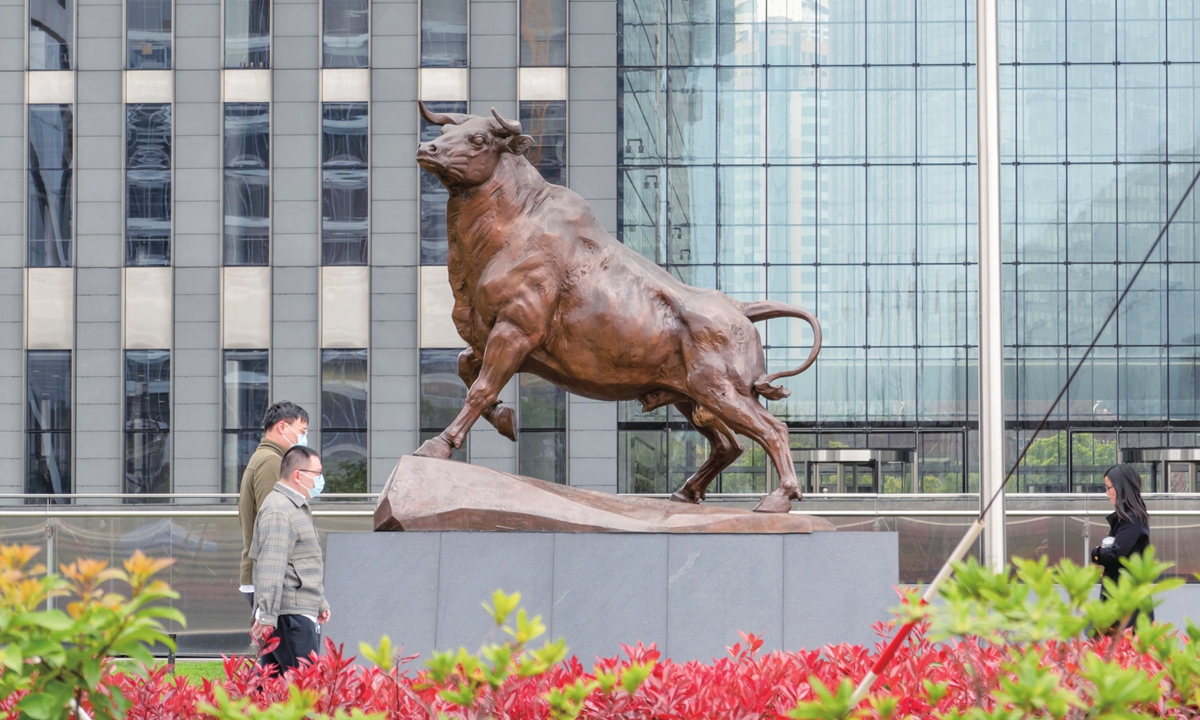
Two men pass the bronze bull at the Shanghai Stock Exchange.
Several top asset management giants have increased their stakes in leading Chinese concept stocks in preparation for the further recovery of the Chinese capital market, boosted by a slew of stabilization measures.
US Securities and Exchange Commission (SEC) Form 13F filings - a quarterly report filed by institutional investment managers to the SEC - showed that some managers increased their holdings of leading Chinese stocks in the fourth quarter of 2023.
A Form 13F report submitted by the Canada Pension Plan Investment Board (CPPIB) showed that the investment institution acquired shares in several Chinese companies on the US stock market, including Alibaba, Li Auto, JD.com and NetEase in the fourth quarter. Specifically, the company acquired 3.6 million shares of Alibaba valued at $279 million, making it the largest new position added by the fund.
Soros Fund Management raised its holding of Alibaba to 75,000 shares, an increase of 87.5 percent, during the fourth quarter.
From September to December 2023, holdings of domestic bonds by foreign investors increased by over $60 billion, indicating a growing interest in investing in Chinese assets, data from the State Administration of Foreign Exchange showed.
The bullish view on Chinese assets comes as the Shanghai Composite Index on Wednesday neared the 3,000-point benchmark during midday trading and northbound net inflows hit the highest level since July 2023.
The Shanghai Composite Index closed 0.97 percent higher on Wednesday, the sixth consecutive daily gain. The Shenzhen Component Index rose by 0.79 percent, and the ChiNext Index was up 0.36 percent. Net inflows from northbound funds reached 13. 59 billion yuan ($1.94 billion).
The recovery of the Chinese stock market comes after the securities regulator issued a series of new measures and stepped up regulatory efforts, showing a resolve to stabilize the market.
China's stock exchanges on Tuesday said major quant fund Lingjun Investment had broken rules on orderly trading and barred it from buying or selling for three days, sending a strong regulatory signal on cracking down on illegal and irregular actions of quantitative institutions.
The Shanghai and Shenzhen bourses said they will strengthen monitoring of quant trading, especially abnormal trading behavior and leveraged products, according to statements posted on their websites late on Tuesday.
An official of the China Securities Regulatory Commission (CSRC) said more measures to regulate quantitative trading will be rolled out, and it will strengthen communication with investors to promote the healthy development of quantitative trading and market stability, the Shanghai Securities News reported.
The strengthened monitoring, analysis, and dynamic evaluation of quantitative trading, especially high-frequency trading and abnormal trading, have closed a loophole long complained about by investors, Yang Delong, chief economist at Shenzhen-based First Seafront Fund Management Co, told the Global Times on Wednesday.
During market downturns, some quantitative trading products were sold in large quantities in a short period of time, causing the market to accelerate its decline. There were also concerns that high-frequency trading was using technology to take advantage of smaller investors, Yang explained.
On Sunday and Monday, the first two working days following the Chinese Lunar New Year holidays, the
CSRC convened more than 10 meetings with market participants, experts and scholars, according to the Securities Times on Tuesday.
Wu Qing, who was appointed as the chairman of the CSRC on February 7, and other officials of the regulator separately chaired the meetings.
Some focuses include strengthening IPO approvals, cracking down on financial fraud and improving regulatory mechanisms on institutions and industry practitioners.
"This demonstrates the determination of the CSRC under its new leader to maintain market stability, which has greatly boosted confidence in the capital market," Yang said.




